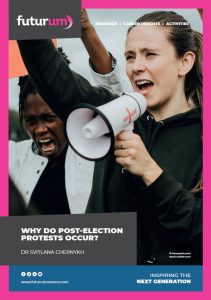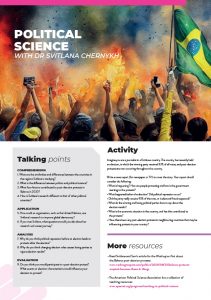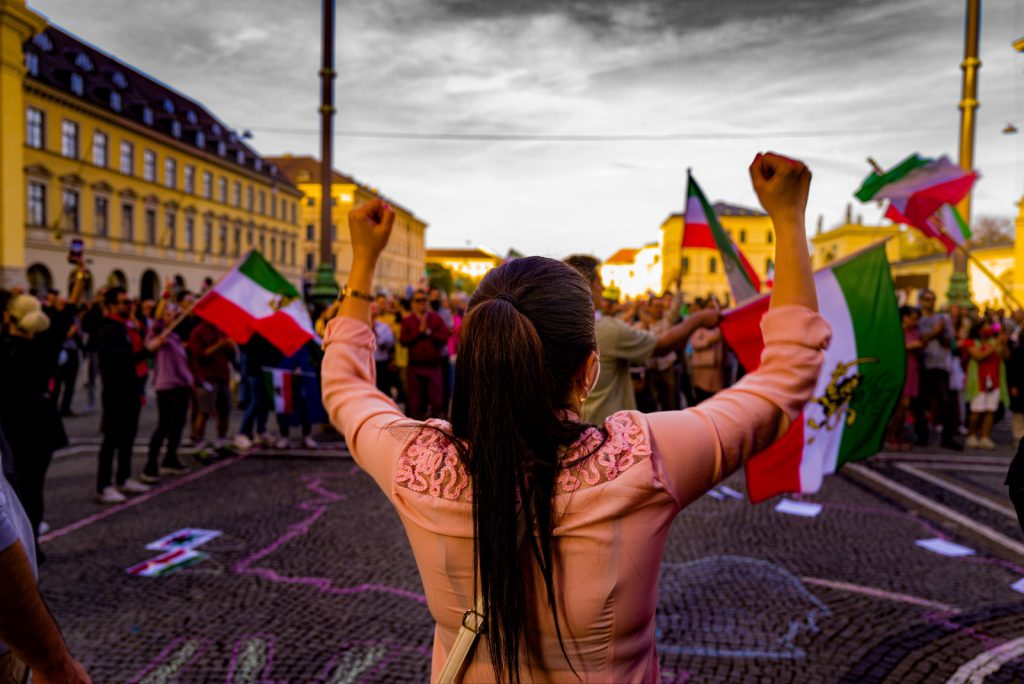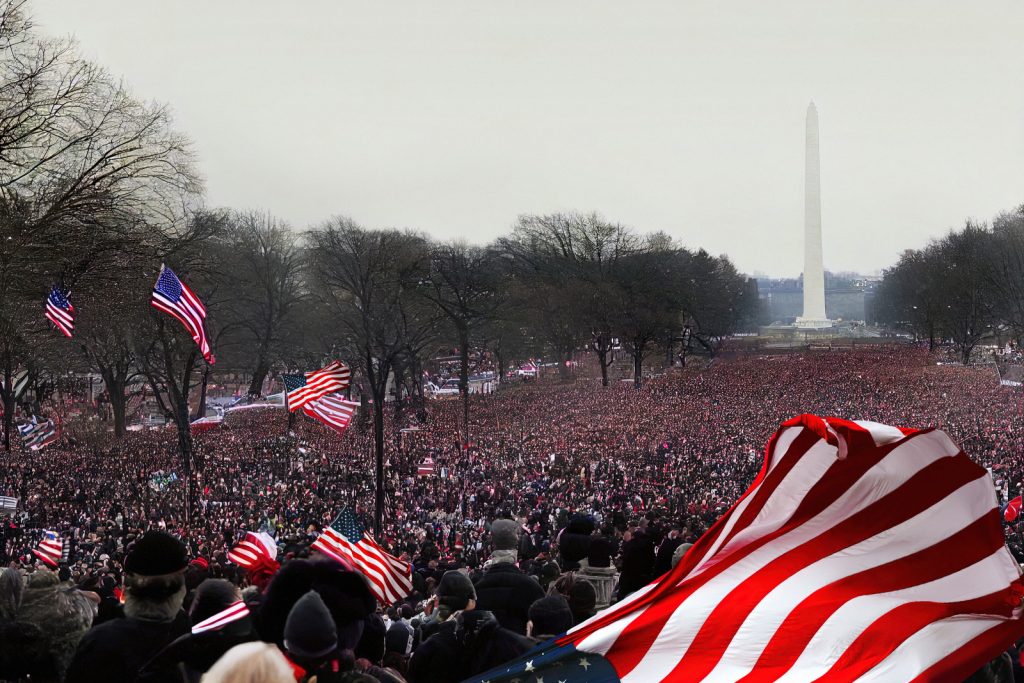Why do post-election protests occur?
Democratic elections have played a crucial role in making societies fairer and more equal. However, what happens when you live in a country where a political party rejects the election result, where post-election protests are common, or where the election itself might have been fraudulent? At the Australian National University in Canberra, Australia, political scientist Dr Svitlana Chernykh is researching why post-election protests occur.
Talk like a political scientist
Democracy — a form of government in which citizens choose their leader
Electoral compliance — when political parties do not undertake any actions to overturn an election result
Electoral fraud — illegal interference with the process of an election, usually by falsely increasing or decreasing the votes for a candidate
Empirically — when something is tested by observation or experimentation rather than by theory or logic
Heterogeneity — the quality of having differences
Incumbent — being in power when an election happens
Multiparty election — an election where multiple political parties run for office
Political repression — the act of preventing citizens from expressing political opinions, e.g., imprisoning people for their political views
Elections are the cornerstone of democracy, allowing a country’s citizens to choose who leads them. However, these elections do not always go smoothly, or even fairly. Protests following elections occur around the world for a variety of reasons. Political parties that lose an election may refuse to accept the election results, and this frequently leads to political, economic and social repercussions.
At the Australian National University, Dr Svitlana Chernykh is examining post-election protests in countries in the former Soviet Union, Sub-Saharan Africa and Southeast Asia, to discover what conditions cause them to occur. Svitlana chose to compare countries in these regions because many of them started holding multiparty elections around the same time, in the late 1980s and early 1990s. “This allows us to establish a non-arbitrary starting point for our analysis,” she explains. Most importantly, however, these regions account for over 60% of all post-election protests that have happened worldwide in the last 30 years.
Despite these similarities between the regions, there are also crucial differences. “In terms of political conditions, countries in these regions offer heterogeneity with respect to regime type, electoral systems, organisation of electoral management bodies, quality of elections, economic conditions and other variables that have been hypothesised to affect electoral compliance,” Svitlana explains. “This variation is important as it allows us to explore the impact of these different factors on post-election protests.”
What is novel about Svitlana’s research?
Svitlana examines post-election disputes at national, electoral and party levels, and she combines qualitative and quantitative data to gain a more accurate perspective. Her approach is different from the ones usually used by political scientists to study post-election protests, allowing her to generate new insights into the topic.
While many political scientists focus solely on post-election protests, Svitlana treats them as only one of the possible strategies that a political party might use in response to election defeat. She also examines the characteristics of the political party itself, not just the election or the country, to see how the characteristics of the individual parties might affect electoral compliance. While other researchers have primarily looked at election fraud to determine why losing parties might reject election results, Svitlana looks beyond the quality of the election to consider other factors as well. “Election fraud may take many forms and it is too broad a concept to generate any useful, non-obvious explanation for parties’ post-election strategies,” she says.
Since election fraud is illegal, it is difficult to observe empirically. “In this project, I advance a theory that focuses on the strategic incentives for electoral rejection, thus allowing us to unpack the black box of electoral manipulation and test the impact of different factors at both the election level and the party level,” Svitlana explains.
What has Svitlana discovered?
Svitlana found that events before an election have an impact on post-election events. If election-related rules are changed before an election (e.g., a new voting system is introduced), then there is a higher chance that losing political parties will reject the election result and stage post-election protests. Svitlana and her colleague, Dr Sam Bell, also discovered that incidences of political imprisonment affect the probability of post-election protests. Political imprisonment is when an individual is imprisoned because of their political views, usually for expressing opinions or conducting activities that oppose the government.
How does political imprisonment influence protests?
Svitlana and Sam statistically analysed data from all national elections worldwide, from 1982 to 2012, and examined whether pre-election political imprisonment increased the probability of post-election protests, accounting for the effects of opposition party strength, economic conditions, fraud and other factors that cause election protests. “We found that when an incumbent party won an election, and there was no recent history of political imprisonment, the probability of post-election protests was just 8%,” says Svitlana. “However, when there was widespread political imprisonment before the election, the probability of protests more than doubled to 20%.” This discovery that pre-election political repression contributes to post-election protests was an important revelation.
Reference
https://doi.org/10.33424/FUTURUM341
A case study: What happened after the 2020 elections in Belarus?
In August 2020, the incumbent president of Belarus, Alexander Lukashenko, claimed re-election victory with 80% of the vote. The election was followed by widespread protests throughout the country, with protesters declaring the results fraudulent and demanding a new election. “The Belarusian government responded with violent repression, detaining and allegedly beating thousands of protesters,” says Svitlana.
Before the election, Lukashenko had imprisoned many political activists and opposition party leaders. “For example, in May 2020, Siarhei Tsikhanouski, a well-known Belarusian vlogger and activist, announced he would run in the election. Two days later, Lukashenko had him arrested. The Belarus election authorities then ruled Tsikhanouski ineligible to run for president,” Svitlana recounts.
Svitlana analysed the Belarus election and found that the protests occurred for four reasons: election fraud, a poor economic situation, the recent post-election protests in nearby countries, and political repression (especially political imprisonment). “The first three factors have been widely connected to post-election protests in previous research,” says Svitlana. The results of her research with Sam explain the contribution of political imprisonment.
What are the implications of Svitlana’s research?
Svitlana’s work will help improve electoral management and the quality of democracy around the world. “This is of great significance to the millions of people who live in emerging democracies,” she says. As well as being useful for academics working in political fields, this research will be helpful for non-governmental organisations (NGOs), policymakers and other individuals working to promote free and fair elections. “In a world where a large number of elections are rejected and frequently spiral into political, economic and humanitarian catastrophes, it is imperative to uncover why political parties choose to reject electoral outcomes.”
 Dr Svitlana Chernykh
Dr Svitlana Chernykh
School of Politics and International Relations, Australian National University, Australia
Field of research: Political Science
Research project: Analysing the causes of post-election protests and why political parties reject election results
Funder: Australian Research Council (ARC)
ABOUT POLITICAL SCIENCE
Working in political science is very different to working in politics, though these two areas are often confused. “Careers in political science include academic and non-academic positions,” says Svitlana. You could become a professor at a university, where you teach political science and conduct research, or you could conduct political science research for an international organisation such as the United Nations or World Bank. In contrast, careers in politics usually involve working in governance. “This includes people who are elected politicians, as well as their support staff, such as legislative assistants, policy analysists and campaign managers,” explains Svitlana.
What are the challenges and rewards of political science?
“The best part of being a political scientist is knowing that my work may help make the world a better place, by improving the lives of people and making the world more peaceful,” says Svitlana. “The challenge is that it takes times to see the impact of my work. It’s different from being a medical doctor, for instance, where you help people and immediately see the results of your work.”
Working at a university means that Svitlana also spends time teaching students, an aspect of her job that she finds very rewarding. “When a student thanks me for a course or tells me how my class made a difference for them, it is absolutely incredible.”
What does a typical day for Svitlana involve?
“As an academic, my role includes research, teaching and service,” she explains. “During a typical day during the semester, I may end up doing all three. For my research, tasks include writing, data analysis and data collection. If I am teaching, I will spend time preparing for the class and then teaching it. I also spend time answering emails and attending meetings.”
Pathway from school to political science
• Many universities offer undergraduate degrees in political science or international relations. You could also become a political scientist after studying politics or economics.
• Visit the School of Politics and International Relations at the Australian National University to explore the courses offered and discover what research is conducted: politicsir.cass.anu.edu.au
• When at university, Svitlana recommends taking courses in mathematics, statistics and research design. A lot of political science is quantitative, so being good with numbers is important!
• Communicating with others is an important skill for political scientists, so work on developing your written and spoken communication skills. “Speaking additional languages is very useful in political science,” says Svitlana.
Explore careers in political science
• If you’re interested in a career in political science, Svitlana suggests reading the news regularly and getting involved in practical political-related activities. “There are many ways to get practical experience,” she says. “You can participate in Model United Nations programmes (www.nmun.org), volunteer as a research assistant on a university-led project or do a summer internship with a policy or government department.”
• “Learning to do ‘deep work’, where you stay focused on a cognitively demanding task for a protracted period of time, is very important for political science, and for generally being successful in college,” says Svitlana. “Time management is also important.” Cal Newport has a great website with tips for students to improve their deep work and time management skills: www.calnewport.com/blog
Meet Svitlana
What inspired you to become a political scientist?
When I was younger, I was interested in sports, especially running, and languages. I became interested in political science and international relations in high school. My initial interest in political science was sparked by observing how different countries transitioned to democracy in the early 1990s. Some were successful, others less so. I was curious about why these differences occurred.
As a political scientist, is it hard to keep your personal political opinions out of your research? How do you ensure your research remains neutral and impartial, if you have strong feelings about the way governments are acting?
This is a great question! I try to work only on topics where I know I can stay impartial and objective. This means sometimes not working on projects which might be personal. I also use a mixture of different methods, datasets and methodological approaches when trying to answer my research questions as this helps to keep my own feelings out of my conclusions.
In what ways do you benefit from your international background?
I studied for my bachelor’s degree in international relations in Ukraine, then got my master’s and PhD in political science in the US. I then worked in the UK for several years, before moving to Australia. This has allowed me to meet, work with and learn from many incredible people around the world. I have gained experience from studying and working in different environments and I have seen how different universities and departments operate. This has all resulted in making me a better political science researcher and teacher.
What do you enjoy doing in your free time?
I still love running. I also enjoy doing any other physical exercise, such as playing tennis or going hiking.
Svitlana’s top tips
1. Finding your ‘why’ is important. Always ask yourself: Why would you like to do something?
2. Read the news regularly!
3. Start by casting the net wide and reading about lots of different things. Once you find what you are interested in, narrow it down and learn more about your chosen topics.
Do you have a question for Svitlana?
Write it in the comments box below and Svitlana will get back to you. (Remember, researchers are very busy people, so you may have to wait a few days.)











